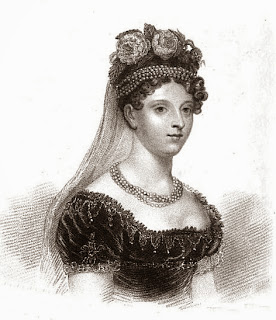I've made a short video called 'The three Charlottes' to introduce three important women in the life of George III: his wife, his eldest daughter and his granddaughter, all named Charlotte. I wrote this speech to give at Casterbridge Speakers - my local Toastmasters International club where I go to improve my public speaking skills. To save you from having to look at me giving the speech, I have put together some pictures to illustrate it.
The three Charlottes
Queen Charlotte
The first Charlotte is Queen Charlotte, wife of George III, who had to bear the agony of watching her husband go mad. (1)
 |
| Queen Charlotte from Memoirs of her most excellent majesty Sophia-Charlotte, Queen of Great Britain by John Watkins (1819) |
Princess Royal
The second Charlotte is Princess Charlotte Augusta Matilda, George III’s eldest daughter, known as the Princess Royal. Princess Royal was placed in a very bad situation when her husband, the ruler of Württemberg, made peace with Napoleon, making her an enemy of her homeland.
 |
| Princess Charlotte Augusta Matilda from A Biographical Memoir of Frederick, Duke of York and Albany by John Watkins (1827) |
Princess Charlotte of Wales
The third Charlotte is Princess Charlotte Augusta of Wales, George III’s granddaughter, whose sad, premature death left her husband and the entire country in mourning.
 |
| Princess Charlotte from The Ladies' Monthly Museum In memoriam (1817) |
Read about Princess Charlotte’s marriage and death here.
Note
(1) It is thought that George III may have been suffering from porphyria which gave the appearance of madness or he may actually have been insane. Either way, he was mentally incapacitated and became incapable of ruling.

No comments:
Post a Comment